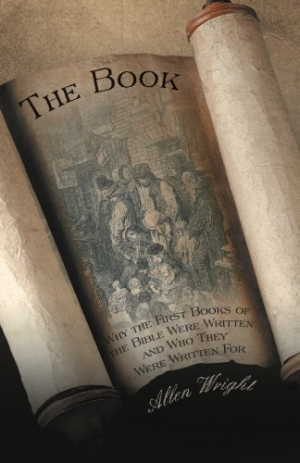The Book
Why the First Books of the Bible Were Written and Who They Were Written For
Exploring historical possibilities, this intriguing analysis attempts to answer one of Western religion’s most pressing questions: why was the Bible written?
When and by whom the books of the Bible were written remain among history’s great mysteries. The Book, by Allen Wright, is a clearly written, well-organized attempt to explain possible motivations for the kinds of stories, laws, and genealogies collected in the first books of the Hebrew Bible. The writing is clean and professional, and the historical examples interesting, though the book is based on a theory rather than upon research.
The author bases his analyses on the idea that the initial books of the Hebrew Bible—from Genesis through Kings II—were written by Jewish scholars in exile in Babylon between 562 and 560 BCE. This time frame is based on research by religious studies professor Serge Frolov, with whom Wright studied. While stating Frolov’s credentials, however, The Book includes neither a summary of how he arrived at those dates nor any details of his supporting evidence, offering no opportunity to evaluate Frolov’s hypothesis. This hypothesis is plausible, but runs contrary to historical consensus that the books were probably written separately and over a longer time line.
By treating that brief span as gospel, The Book often tries too hard to assign motives to the Bible’s writers based on the situation the Jewish people faced in that specific time period. For example, it insists, without evidence, that many stories included in the early books were fictions created by authors to establish a contemporary cultural identity rather than traditional stories that had been passed down through generations, or even loose history. The Book also suggests that the striking similarities between the biblical story of Noah and the flood tale in the Epic of Gilgamesh are automatically a case of appropriation, but both could just as easily be variations on the same initial story. Too often the language lacks qualification, stating possibilities as facts, when just describing them as possibilities would work better.
The Book presents a number of intriguing arguments for how the Bible’s content matched its ancient audience. For example, it effectively notes the Bible’s many warnings against worshipping Baal, tying the practice to the prominence of Phoenician culture in that time period and its potential allure for the book’s intended audience. He notes how the story of David and Goliath presents a twist on similar archetypes from antiquity, giving its hero’s faith as the reason for his victory and suggesting similar faith would empower Bible readers in need of a leader. He theorizes that the detailed laws of Leviticus and Numbers were a way of forging a culture in exile by standardizing customs. In these and other cases, he presents the stories by stating specific Bible passages, and then matter-of-factly connecting them to what we know about what the ancient Hebrews faced in the years 562-560. It doesn’t prove causation, but is interesting to consider.
The numerous assumptions made here turns The Book into more of a theoretical alternative history, but one that can be enjoyed on its own terms.
Reviewed by
Jeff Fleischer
Disclosure: This article is not an endorsement, but a review. The publisher of this book provided free copies of the book and paid a small fee to have their book reviewed by a professional reviewer. Foreword Reviews and Clarion Reviews make no guarantee that the publisher will receive a positive review. Foreword Magazine, Inc. is disclosing this in accordance with the Federal Trade Commission’s 16 CFR, Part 255.

